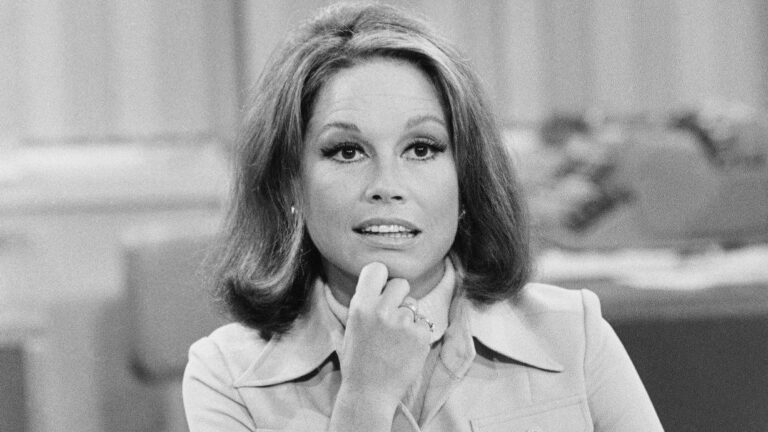
Mary Tyler Moore was a tremendous influential figure in television history, paving the way for other female comedians and actresses and advancing the depth of Hollywood’s portrayal of women. Her legacy has been preserved through reruns of The Dick Van Dyke Show and The Mary Tyler Moore Show, but as is always the case, there was more going on than just what audiences saw on screen. James Adolphus takes a closer look at the legend in a documentary that smartly refers to Moore herself for much insight about who she really was.
Being Mary Tyler Moore opens with Moore being interviewed by David Susskind and enduring a condescending tirade about the duties of a wife and how being a major actress must distract from that. The look on her face says it all, and Moore has an excellent response prepared. Through a treasure trove of interview footage and clips from her series and other work, Moore, who died in 2017 at the age of eighty, comes alive for a new generation as she expresses how she truly feels and what changes she’s determined to make in an industry that at the time didn’t think very much of women.
This is an excellent introductory course to Moore for those who didn’t grow up with her, focusing on her television career and adding in pieces of her personal life, like her multiple husbands and her struggle with alcoholism. But there is an added benefit for those who can remember first watching episode of her two classic TV series and will be prompted by even a momentary clip from one of them to explain or laugh. The full context isn’t necessary, which is a statement on the impact of those shows on the world in an era where instant replays via YouTube weren’t available. It’s a sentiment that those who have never waited for a favorite episode to be aired again simply can’t understand.
One decision Adolphus makes in this film is to include only audio interviews. James L. Brooks, Rob Reiner, and other individuals who knew or worked with Moore speak at length while footage of Moore either on set, in an interview, or in her personal life play. That choice succeeds in keeping the audience enmeshed in Moore and her identity rather than taking them out of the moment. A number of prominent women in today’s Hollywood sing Moore’s praises, but the screen reflects only Moore and her era, adding significance to what she created and the impact it has had longer after her time in the spotlight.
Summing up Moore’s life in just two hours is an arduous task, but this film serves as a competent effort that captures the heart of her comedy and the more serious undertones of her life, which included tragic losses and an unsuccessful attempt to reinvent herself on Broadway. It’s rewarding to see snippets of her multiple speeches upon winning awards, which are all brief and to the point, full of genuine gratitude and an awareness that she is not alone in what she does. The joy of working with her fellow cast members is evident, and hearing her compare her own trajectory to that of Mary Richards (and less so Laura Petrie) is also fascinating and worthwhile.
Being Mary Tyler Moore captures Moore’s spirit, energy, and impact and crafts a compelling narrative about her life. The film doesn’t continue much past the early 1990s but shows her taking time for her own happiness, offering a degree of positivity about the years of work she put in the rewards she was able to enjoy as a result. This film doesn’t show only the good things about Moore and her impressive career, offering a full picture of her onscreen personas and how she came to understand her own significance in the industry and the world.
Grade: B+
Check out more of Abe Friedtanzer’s articles.
Being Mary Tyler Moore makes its world premiere in the Documentary Spotlight section at SXSW and will premiere on HBO in May.

